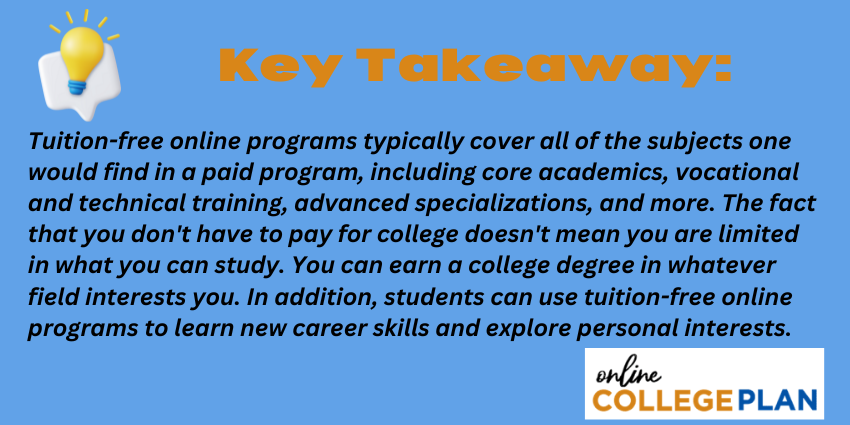What subjects do online tuition-free programs cover?
Find your degree

What can you study in a tuition-free online program? That depends on the type of program you pursue. But the short answer is you can study just about anything you want! Tuition-free programs are not typically limited in subject matter.
When discussing tuition-free online programs, we aren’t just talking about cheap online college courses. We’re talking about ways for students to pursue entire degrees at no charge. Such programs cover various subjects, from core academics such as math, science, English, and social studies to vocational and technical training.
In addition to foundational subjects, tuition-free online programs often offer advanced specializations in fields such as business, healthcare, engineering, education, human resources, and much more. And many offer free personal development courses touching on everything from time management to wine appreciation to art.
In short, the sky’s the limit when it comes to tuition-free colleges. But how can you take advantage of these free college programs?
How Can I Attend a Tuition-Free College?
The primary way for students to attend a tuition-free college is by enrolling in a school that meets 100% of demonstrated financial need for admitted students. This is also sometimes referred to as a “full-ride scholarship.”
Surprisingly, several prestigious universities in the US offer a free college education. These include Harvard, Yale, MIT, Stanford, and others. But many other well-known colleges and universities in the United States are known for meeting 100% of demonstrated financial needs, too. Here’s how it works:
When a college says it meets 100% of demonstrated financial need, it promises to provide enough financial aid to cover all the costs a student’s family can’t afford. The costs can include tuition, fees, room, board, books, and other expenses. The type of aid offered can be in the form of grants, scholarships, work-study, and low-interest loans. The college looks at the family’s financial situation using forms like the FAFSA or CSS Profile to determine how much aid the student needs.
Each college has different rules for how they meet this need. Keep in mind that you must first be accepted to the school to be considered for a full financial aid package. There may also be other criteria you must meet.
Other Ways to Attend College for Free
Attending college for free is a goal for many students. Even if you don’t receive a full financial aid package, other ways exist to make this a reality. Here are some other strategies you can explore:
Residency: Some states and municipalities offer free tuition at public colleges in their coverage areas. These programs are typically for students who have graduated from high school in a particular region. However, some of these free college programs may be available to residents who have worked in a certain state, county, or town.
Scholarships and Grants: Scholarships and grants are financial aid awards that do not need to be repaid. They can be based on academic achievement, financial need, talent, ethnicity, or other criteria. Students should actively search and apply for scholarships and grants from colleges, private organizations, foundations, and government agencies.
Financial Aid: Completing the Free Application for Federal Student Aid (FAFSA) is the first step to determining eligibility for federal financial aid programs such as Pell Grants, Federal Work-Study, and subsidized loans. Additionally, states and colleges may offer their own need-based financial aid programs.
Work-Study Programs: Federal Work-Study (FWS) is a program that provides part-time employment opportunities for undergraduate and graduate students with financial need, allowing them to earn money to help pay for educational expenses while gaining work experience.
Employer Tuition Reimbursement: Some employers offer tuition reimbursement or assistance programs to help employees further their education. Students can explore job opportunities with companies that provide these benefits and pursue degrees or certifications that align with their career goals.
Community College and Transfer Programs: Attending a community college for the first two years of a bachelor’s degree program can be significantly more affordable than attending a four-year institution from the start. Many community colleges have articulation agreements with four-year colleges and universities, allowing students to transfer credits seamlessly. While not free, it can result in earning a cheap bachelor’s degree.
Service: Military service, such as the Army, Navy, Air Force, Marines, or Coast Guard, can provide educational benefits through programs like the GI Bill, Tuition Assistance, or the ROTC scholarship program. Military service members, veterans, and their dependents may be eligible for various educational benefits to help cover the cost of college tuition, fees, and living expenses.
Credit for Life Experience: Credit for life experience is when a college gives students academic credit for things they’ve learned outside of school, like work, military training, or volunteer experience. The purpose is to acknowledge and reward students for their practical knowledge and skills, allowing them to “skip over” some coursework. Naturally, students do not pay for classes they don’t need to take. The policies and criteria for awarding credit for life experience can vary between institutions. Credit for life experience is also a great way to get a quick online degree.

Free Continuing Education and Professional Development
Online tuition-free programs also often cover continuing education and professional development courses. These courses are designed to help individuals enhance their skills and knowledge in a particular field. Some of the subjects covered in these courses include business, finance, healthcare, education, and technology. The courses are usually offered by universities, colleges, and professional organizations. And they allow individuals to learn at their own pace and convenience. They offer flexibility in terms of time and location, with many courses offered online.
Additionally, students can pursue their personal interests with free online courses in hundreds of areas. Have you always wanted to study a foreign language, learn photography, or develop your baking skills? There are free online courses for all of these and more.
Frequently Asked Questions
Tuition-free online colleges offer a wide range of academic disciplines, including but not limited to business, computer science, engineering, health sciences, humanities, social sciences, and many others. The availability of academic disciplines varies from one institution to another.
Yes, international students can access tuition-free online university programs. However, the availability of courses will vary depending on the institution. Some tuition-free online universities offer courses in various academic disciplines, while others may have limited course offerings.
Tuition-free online colleges in the USA offer various degree programs, including associate, bachelor’s, and master’s degrees. The availability of degree programs may vary from one institution to another.
Tuition-free online universities typically offer a wide range of subjects, including but not limited to accounting, biology, chemistry, economics, history, mathematics, physics, and many others. The availability of subjects varies depending on the college you choose.
Tuition-free online programs sustain their operations through various means, such as grants, donations, and government funding. Some tuition-free online universities also offer paid courses or services to generate revenue.
